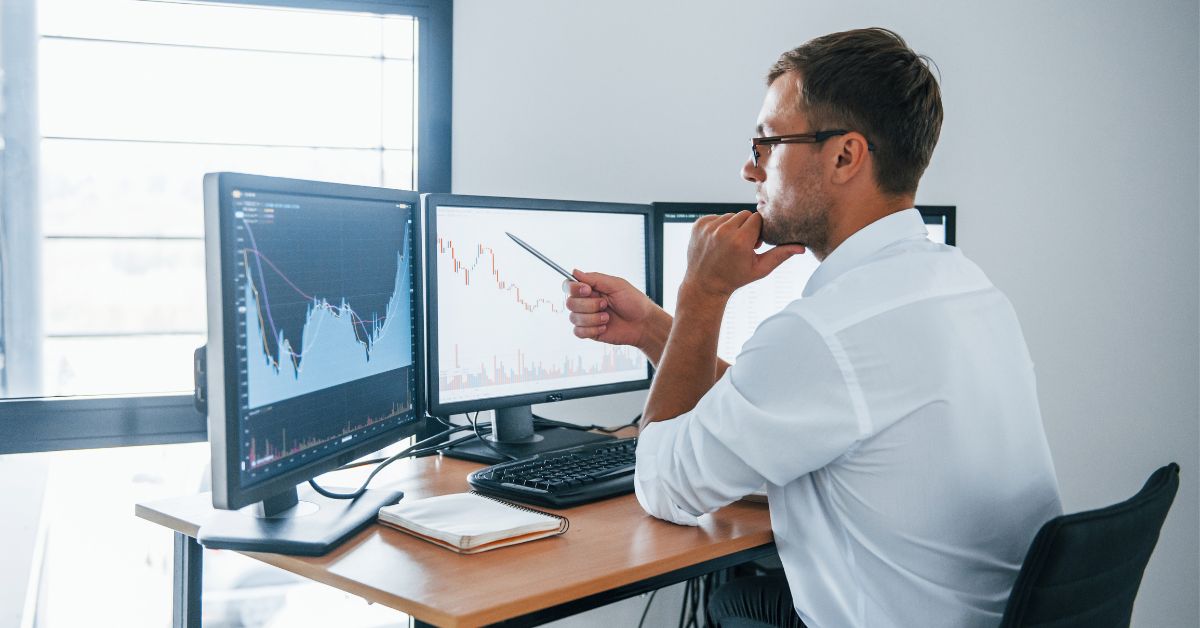Trading psychology is the mental and emotional aspect of making trading decisions. In the financial markets, it can make the difference between success and failure. Even the best strategies can fail without the right mindset, as many traders focus solely on strategy and technical analysis. Mastering your trading psychology is as important as mastering market trends.
Developing mental resilience, patience, and emotional control can set you apart from other traders. In this article, we’ll discuss how to cultivate a good trading psychology so that you’re ready to take on the market. Your trading psychology helps you manage emotions like fear and greed so you can make better decisions.
Platforms like Prime XBT provide reliable resources and tools that can help you maintain discipline and control during trades. Such platforms can help traders stay focused and perform better. So, join PrimeXBT today! Use promo code PRIMEOTT to receive a +7% bonus on your deposit.
Why Trading Psychology Matters?

Trading psychology is vital because it directly impacts your decisions. Emotions like fear and greed often cloud judgment, leading to impulsive trades. A disciplined mindset helps you follow your trading plan. Without discipline, even the best strategies can fail. Patience is key in waiting for the right opportunities.
When emotions take control, traders make mistakes. Emotional control is crucial for consistent success. Confidence in your strategy is essential, but overconfidence is dangerous. It is common for overconfident traders to take unnecessary risks.
Making better decisions requires balancing confidence with caution. A better understanding of trading psychology can lead to better long-term results. Mastering your emotions gives you a significant advantage. Successful traders know that psychology drives performance.
The Core Components of Good Trading Psychology
You should be aware of the following components of good trading psychology.
Discipline
Discipline is the backbone of successful trading. It involves sticking to your trading plan regardless of market conditions. Without discipline, emotions can drive your decisions, leading to impulsive trades and unnecessary losses.
A disciplined trader follows a set of rules consistently. These rules help avoid emotional reactions during volatile market situations. By maintaining discipline, you ensure that every trade aligns with your strategy.
Patience
Patience is essential for waiting for the right trading opportunities. Many traders jump into trades out of impatience. It often leads to mistakes and losses. Patience helps you avoid overtrading, which can drain your capital.
A patient trader waits for setups that meet their criteria. It increases the chances of success and reduces unnecessary risks. Developing patience takes time but is crucial for long-term success.
Emotional Control
Emotional control is crucial in trading. Emotions like fear and greed can cloud judgment, leading to poor decisions and potential losses. A trader with emotional control remains calm during market fluctuations.
They don’t let emotions dictate their actions. Techniques like mindfulness or taking breaks can help manage stress. By controlling emotions, you make more rational and effective trading decisions.
Confidence vs Overconfidence
Confidence is necessary for making informed decisions. However, overconfidence can be dangerous in trading. Overconfident traders often underestimate risks and take unnecessary chances, leading to significant losses.
Confidence should be based on knowledge and experience. Overconfidence, on the other hand, is often a result of recent successes. Balancing confidence with caution ensures you make well-considered trades. It helps protect your capital while pursuing profits.
Common Psychological Pitfalls in Trading

There are a few psychological pitfalls you need to be aware of when trading.
Fear of Missing Out (FOMO)
FOMO is a significant issue for many traders. It occurs when you feel compelled to join a trend. The fear of missing out can drive impulsive decisions. Often, traders enter trades without proper analysis.
It leads to buying at inflated prices and selling at a loss. FOMO-driven trades rarely align with your strategy. Overcoming FOMO requires patience and discipline. It’s crucial to wait for setups that fit your plan. By avoiding FOMO, you reduce the risk of making costly mistakes.
Loss Aversion
Loss aversion is the tendency to fear losses more than value gains. This fear can lead to holding onto losing trades. Traders often hope a bad trade will turn around. However, this approach can increase losses.
Loss aversion makes it difficult to cut losses early. Accepting that losses are a normal part of trading is essential. A good trader knows when to exit a losing position. Managing losses effectively protects your trading capital. By controlling loss aversion, you improve your overall performance.
The Need to Be Right
The need to be right is a common psychological pitfall. Some traders focus more on proving their trades are correct. This mindset can lead to stubbornness and poor decisions. Instead of adapting, traders hold onto the wrong positions.
Flexibility is vital in trading; markets are unpredictable. It’s important to recognize when a trade isn’t working. Adapting your strategy can prevent significant losses. Letting go of the need to be suitable leads to better trading decisions.
How to Develop a Strong Trading Mindset
You should follow these strategies to develop a strong trading mindset.
Setting Realistic Expectations
Setting realistic expectations is crucial for trading success. Unrealistic goals can lead to disappointment and risky decisions. Define achievable targets based on your experience and market conditions. Avoid expecting to become wealthy overnight; it’s a gradual process.
Setting short-term goals helps in measuring progress. Long-term objectives keep you focused on sustainable success. Realistic expectations lead to better decision-making and less emotional stress. They also help you stay grounded during volatile market conditions.
Continuous Learning and Adaptation
Continuous learning and adaptation are essential for trading success. Markets are dynamic, and staying informed is vital. Regularly update your knowledge through books, courses, and webinars. Analyze your trades to identify what works and what doesn’t. Adapt your strategies based on new information and market changes. Learning from both successes and failures refines your approach.
If you are looking for personalized guidance, please consider our On Tilt Trading Store trading psychology coaching. Through our coaching sessions, you can master emotional control and develop a robust trading mindset. Stay open to new ideas with expert support and embrace feedback. Your trading strategy will remain relevant and practical if you continuously improve it.
Practicing Mindfulness and Stress Management
Practising mindfulness and stress management enhances your trading performance. Mindfulness techniques, like meditation, help maintain focus and reduce anxiety. Regular stress-relief activities, such as exercise, keep you balanced.
Managing stress prevents burnout and improves emotional control. A clear, calm mind aids in making better decisions. Incorporate relaxation practices into your daily routine. Stress management helps you handle market volatility more effectively. Staying centred improves your trading results.
Building a Personal Trading Psychology Plan

Building a personal trading psychology plan is essential for sustained trading success. Assess your emotional and mental strengths and weaknesses. A structured plan helps you manage emotions and follow trading rules so you’re disciplined.
Self-Assessment
Self-assessment is the first crucial step in improving trading psychology. Start by evaluating your current emotional and mental strengths. Reflect on how you react to market stress and losses. Identify recurring patterns in your trading behaviour. It involves reviewing past trades and emotional responses.
Recognize areas where you tend to make mistakes. Regular self-assessment helps track your progress and adjust strategies. It also aids in understanding personal triggers and improving decision-making. By knowing your psychological profile, you can tailor your approach to manage emotions better.
Setting Personal Rules and Guidelines
Setting personal rules and guidelines ensures consistency in your trading approach. Develop clear, specific rules for entering and exiting trades. Include risk management strategies to protect your capital. Define how much of your capital you will risk on each trade. Establish criteria for taking profits and cutting losses.
Personal guidelines help maintain discipline and avoid impulsive decisions. They create a structured approach to trading, reducing the influence of emotions. Review and refine your rules regularly as you gain more experience. Sticking to these rules improves overall trading performance and consistency.
Monitoring and Adjusting
Monitoring and adjusting your trading psychology plan is essential for continuous improvement. Review your psychological state and trading results regularly. Identify what strategies are practical and where adjustments are needed. Track your progress towards psychological goals and emotional control.
Make necessary changes based on performance and new insights. Seek feedback from mentors or coaches if required. Be open to refining your approach to better suit evolving market conditions. Regular monitoring ensures your plan remains effective and aligned with your trading goals.
Conclusion
Mastering trading psychology is the key to long-term success in the markets. If you understand and manage your emotions, you can make better decisions and avoid costly mistakes. The foundation for a successful trading mindset is discipline, patience, and emotional control.
Are you tired of losing money due to panic selling, FOMO, overtrading, and bag holding? We recommend the Vestinda trading app. It helps eliminate emotional decision-making with automated crypto trading strategies.



